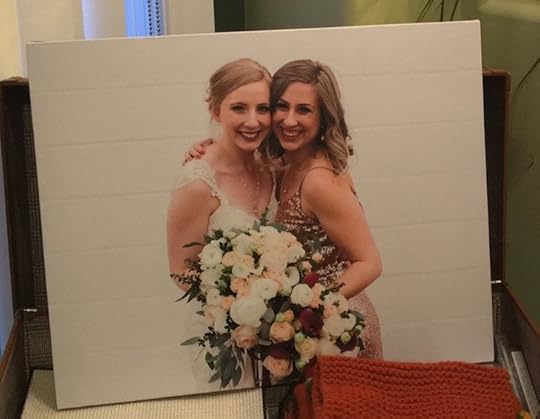Sheila Wray Gregoire's Blog, page 69
December 2, 2019
Sentimental, Personalized Christmas Gift Ideas to Celebrate Family and Make You Cry
Are you at a loss trying to find Christmas presents for someone who has everything?
I try to be quite deliberate with gifts, getting things that people truly need and that won’t just take up space in closets or drawers or on counters. And I try to get things that celebrate who someone is to me.
This month I’ll be sharing some fun gifts, like boxer shorts for your husband, and I’ve got past gift round-ups for stocking stuffers for your husband (and sexy stocking stuffers for your husband!). But I’d like to talk about sentimental gifts right now–gifts that would work for engaged or married adult children, for grandparents, for parents, for siblings–even for your spouse.
I do rely on the income from my blog to pay my staff and to keep this blog up. So I’ve looked for some affiliate products to recommend in December as you all are thinking about Christmas. But here’s the deal: I’m only going to share stuff that I actually personally like. And I’m going to have much more than just gift guides coming in December! (this one’s here because a number of these awesome gifts have today as a deadline if you want it for Christmas, but I’ve got other posts planned, too).
So here goes!
Turn a Photo into One-of-a-Kind Artwork
I love this idea! Take a photo that means something to you–a family photo, a photo with babies, even a photo of a pet that has passed away–and you can have it turned into a one-of-a-kind pencil drawing, ink rendering, or even watercolor painting or oil painting!


Create a romantic picture for your wall–or gift it to an engaged couple!

Or have an old vintage photo turned into a sketch for to celebrate the long marriage of a couple you love (that’s a great gift for grandparents!).
And I think this is wonderful for pets, too! My sister-in-law bought my OTHER sister-in-law something similar last year after their beloved dog passed away. It was really sweet when we were all sitting down and opening the presents.


It’s just a unique way of celebrating your family and the people who are important to you, and I know as a mom I would appreciate something like this so much more than pretty much anything else the kids would get me.
MyDavinci.com also does caricatures, modern art from photos, and so much more. And, yes, they even do this really corny Adam and Eve picture where they’ll superimpose your faces. Some couples would probably find it quite hilarious!
And the reason I’m running this particular post so early in the Christmas season is because today is the last day to order a pencil drawing and get it in time for Christmas (with regular shipping in the United States).
Some other artwork you can still get if you wait a bit, but if you want a pencil or ink rendering, today’s the day! And I think this is a lovely idea.

Explore the artwork you can make!
Create Photo Books to Celebrate a Year in Your Life, an Event, or a Relationship
Blurb produces high quality books that you can give to celebrate important milestones in your life–or your family.
Joanna has ordered just a ton of these photo books, and her toddler Mari spends hours looking through them, learning the names of all the relatives you don’t see very often.
It’s pretty easy–you choose the size of book you want, and the type of paper and cover. And then you can do a combination of photos, or add text as well.
They can pull pictures automatically from your Instagram account, or you can upload photos.

And the possibilities are endless. Have you gone through a tough year? You can create a memoir book with some of your thoughts, prayers, favourite Bible verses, and what you learned, and give it to your loved ones to encourage them or as a keepsake. Do you have a whole pile of family recipes that you want to make sure don’t get lost? Create a cookbook with a picture of your grandma or your Aunt Mary or whomever, and then add some more photos of the food. Or what if you’ve written a children’s book and illustrated it? Here’s an easy way to get some printed!

Print out a year in your child’s life for all the grandparents!

Or share your family’s favourite recipes.
Here’s another awesome idea: Do you have a creative child who writes stories and illustrates them? Take a story and turn it into a book for them! Reward their creativity, and encourage it to continue.
Again, today’s a great day to order from Blurb! They’ve got a 50% off sale with the coupon BIGFIFTY, but it ends tonight!
Make some photobooks as keepsakes!
Turn Your Photos into Inexpensive Canvases
I love the idea of adding texture to my walls–not just photos, but canvas.
This year, now that we have a baby in the family, we’re going to turn my upstairs hallway into a photo wall. I decided to start with a large 16×20 canvas picture of my two girls, taken at Katie and David’s wedding. Then on Rebecca’s side of the photo I’ll feature pictures from her wedding and from her family (including my new grandson!), and for Katie’s side I’ll feature photos from her wedding and her life. And it will all grow from there!
But I like the idea of a canvas print anchoring it all. And Easy Canvas Prints can do that for you, too. You just upload your photo, choose your size, and you’re ready to go!

Canvas prints are super-inexpensive ways to create a large piece of art to hang in the middle of the wall over a bed, over a fireplace, or centered in the living room wall.

A variety of sizes are available, from 8×8 up to 40×60–and they even do rectangular ones like the one above–16×48.
You choose the border style, and then it comes ready to hang. And for all my Canadian readers–yes, they ship in Canada, too!
Let's see what the pictures would look like!
Keep Someone You Love–or Someone You’ve Lost–Close to Your Heart
Christmas can be a tough time for many people, because as you’re sitting around the Christmas table you notice all those who aren’t there anymore.
If you’ve lost someone close to you, or if someone you love has recently gone through a loss, a memorial necklace or locket can be a lovely gift. But lockets are also lovely ways to celebrate the relationships that mean the most to you, too.

Heartsmith sells unique and unusual lockets and jewelry, at an affordable price. Choose sterling silver, or opt for 14 kt gold. And they have lots of Christian symbols and verses on lockets, too.


Let me see them!
Chart Your Travels, Your Dreams, or Your Family
Keith and I are big into tracing our family history, and world maps like these are great to see where all the different branches came from.
Or you can stick a pin in every place you’ve been together–or every place you’d like to go together!

It’s available in a variety of sizes, and comes ready to hang, along with 100 push pins of various colours.


Use different colours for different years (or decades) of your marriage! Or for different branches of your family tree. Or for dreams of where you’d like to go when.
And if the world map isn’t your thing, you can get more specific push pin maps, as well, like only the United States, only North America, or only Europe.
See the World Map
See the map of Europe
See the United States Map
See the North American Map
Knit or Crochet to Commemorate a Year!
Want something more DIY?
Maybe your parents are celebrating their 40th anniversary this year, so you can knit or crochet them an afghan to celebrate with them! Or you could do one for your own anniversary.
Here’s a great idea: It’s called a temperature afghan or blanket. You can either do single crochet or do garter stitch in knitting. Each row (or each ridge, if knitting) represents the temperature of that day of the year. So you look up the temperature where they lived for the year that you’re commemorating, and then you use the chart to decide the color for each row.

All the instructions are here, but I love this idea!
Think Outside the Gift Box
You’ll probably see that the theme of everything I’ve got here is to think outside the box, and come up with ideas that are sentimental and personal.
It reminds me of a book I read a few years ago that was part of the Ultimate Homemaking Bundle–Thinking Outside the Gift Box. I actually ended up using some of their ideas (the map one, above, was from them!), and I wrote a big post on it: 10 DIY Gifts for Your Family that Will Make You Bawl. We’ve still got over three weeks before Christmas is here, and if you’re a DIY person, take a look at this book for some more creative ideas!

Let me see it!
So there’s my list of sentimental gifts to buy this Christmas!
I think of it this way: Christmas is when Jesus left perfection to come and live with us and share with us. He loved us, and wanted to know us. Indeed, another name for Christ is “God with us.”
Christmas is ultimately about relationship–restoring relationship with God but also with each other.
So this year, as you’re thinking about what to get people, think as well about gifts that can speak to your relationship, and to how much the people around you mean to you.
And don’t forget that many of these deals are gone today! So check it them out!
What’s your favourite sentimental gift you’ve ever received? Let’s talk in the comments!
November 29, 2019
Healthy Marriage Teaching Always Involves the Word “Mutual”
I want to write a quick, more newsy post today with three things that I’m hoping I can tie up in a pretty bow as if they go together.
1. Do you know the 3 most important marriage skills?
I listened to an interesting TED talk recently about the 3 core skills for successful romantic relationships. I’m going to do a podcast on this soon, but they are: insight; mutuality; and emotional regulation (basically self-control). When I wrote my post on what makes a good marriage I think everything that I mentioned boiled down to mutuality, with a large dose of humility tied in. But I think humility can really be equated with her idea of insight. You’re not afraid to look at what’s really going on.
That theme–mutuality–comes up again and again in talks about healthy relationships. You need two people willing to invest. Two people thinking of each other. Two people putting the other first. That’s the biblical model found in Ephesians 5:21-33 (which starts with: “Submit to one another out of reverence for Christ.”)
That’s why I found this TED Talk so interesting. What’s also cool is that it’s about emotional skills we should possess before we even start dating. They explain:
Instruction about healthy relationships exists in the form of couples therapy or premarital counseling, which means either when a marriage is foundering or before it’s even begun. Those are both too late, says Davila. Wait a second — how is premarital counseling too late? “Because people have already selected the person they want to commit their life to,” she explains. “What if they selected poorly? No amount of premarital education can make up for a bad partner choice.”
In an effort to address this gap, Davila and her colleagues are studying what they call “romantic competence.” Romantic competence is, as she puts it, “the ability to function adaptively across all areas or all aspects of the relationship process [including] … figuring out what you need, finding the right person, building a healthy relationship, [and] getting out of relationships that are unhealthy.”
According to Davila and her colleagues, there are three core skills behind romantic competence: insight, mutuality and emotion regulation. “Let me say that we didn’t just make these up out of the blue,” she explains. “We identified the skills based on a thorough review of theory and research. The skills really represent the commonalities across the major theories and research findings on healthy relationships. Because they represent the commonalities, we think they really can help people with all the different parts of the relationship process, and with all different people – whether they’re in a relationship or not.”
Joane Davila
The 3 Core Skills that Every Person Needs for Healthy Romantic Relationships
2. I speak at FamilyLife CANADA marriage conferences, not at FamilyLife U.S. marriage conferences
We’re just back from speaking last weekend in Whistler, British Columbia! Keith and I have been speaking for FamilyLife Canada for over 15 years now, doing at least 50 conferences.
I do need to clear up some confusion, though.
I’ve had some people write to me after attending a FamilyLife U.S. conference that they signed up for because they had thought that if I spoke at these conferences, and they liked my blog, then the conference must be good! Unfortunately, they found the U.S. conferences were very different from my blog. I feel as if I must make a public statement on this, because there is confusion, and I don’t want to be seen as endorsing something that I’m not part of.
Before I start, I want to stress that this is coming from me. I am not writing on behalf of FamilyLife Canada.
While FamilyLife US and FamilyLife Canada are in a cooperative relationship, they are two very separate organizations. The Canadian directors, Neil and Sharol Josephson, have created awesome marriage conference material from scratch. It truly is a unique conference. And if you live in Canada or in a border state, you should take advantage and come to Canada for a conference sometime! My staff attended a weekend getaway last year near Ottawa, and here’s their list of 10 things they learned at a marriage conference.
On the other hand, I have never been to a FamilyLife U.S. marriage conference, and I don’t know any of the speakers. I don’t know what they teach, and I don’t know what their conferences are like. I do know that while Canada has been having two couples speak–that is husband and wife speaking side by side–at all their conferences for over 20 years, FamilyLife U.S. still mainly uses men speaking, with the occasional couple or a wife talking to the women.
When I get emails from couples disappointed after attending a FamilyLife US event, the common thread seems to be that the conferences are very husband-centered, a feeling they get largely because of the predominantly male speakers, but also from the materials.
There is a new director for FamilyLife in the U.S., who may very well overhaul the conferences soon. Again, though, I have no firsthand knowledge of any of this.
I just don’t want people to assume that I’m endorsing FamilyLife U.S. when I actually know very little about them.
Before you sign up for any conference (wherever in the world you are, and whoever is putting on the conference!), just ask some good questions about who will be speaking, and about whether the emphasis is on mutuality.
3. Can you help us improve marriage curriculum overall?
To quote my emailer: “the lack of good curriculum on this subject is appalling.”
I’m trying to change that! Debates over what builds a good marriage often focus on doctrines and interpretations of Scripture; I’d like to add evidence to the mix. If we have numbers behind what helps and what hurts, then hopefully those putting on marriage teaching will have to listen.
So can you help us by filling out our survey? We’ve got almost 15,000 respondents now, but we’d love to keep increasing that! As you’re enjoying a long Thanksgiving weekend, take some time and take the survey. And invite your female family members to take, too!

The Bare Marriage Survey
Thank you! And I hope all my American readers had a great Thanksgiving, and I wish you all a great weekend!
(I’m heading to Ottawa to see my grandbaby again!)
November 28, 2019
Can I Ask You About Trauma and Sex?
Writing about a complex problem in a healthy way is very tricky.
And I’m having that problem right now when it comes to trauma & sex.
Today’s Thanksgiving, so I’m quite aware that the majority of my American readers will be ignoring me today! That’s okay. That’s also why I’m not doing a podcast today. Sometimes we all need a day off to enjoy each other!
But for Americans who have time to be online, or for the rest of us Canadians and all of the Aussies and Kiwis and Brits and Kenyans and others who join me, I thought rather than write a post today I’d ask you all for some input.
Last week I tried to address a problem where a woman who has been sexually traumatized earlier in her life has turned off of sex for good. How can we give a healthy message to her? I’ve written before about the need to go to trauma-informed licensed counselors, not just biblical counselors, because people with trauma need to be treated, not just told they have a spiritual defect.
And so I tried to handle this well. My take was that the first step was some serious counseling, but then that also I would encourage her to try to see sex in a positive way, even if she doesn’t believe it or feel it right now. Get her head lined up with truth. You don’t have to be there yet; you don’t have to understand how you can get there. But at least make that your goal. So get treatment, but also have a healthy goal.
However, some commenters thought that was too much.
I just don’t know what to think. I’ve been through trauma of my own, though not as severe as this woman’s. And my concern is that I don’t want people trapped there. I know it’s horrendous, but I want to point to a way out.
But is that too much for some people? Does trauma so affect you that you can’t even try to think positive messages? And if we believed that, then is healing even possible?
I’ve been hearing so much about the book The Body Keeps the Score lately, and I really want to read it (it’s on my Amazon wish list!). (That link is there because my husband reads my blog *cough* *cough*). I really do want to understand how trauma works.
And so now I’d like to know from you all–was I too cavalier about recovery from sexual trauma? Is it wrong to ask trauma victims to try to see truth, even if it’s difficult? What is the right way to talk about this stuff? I really want to do it right, because I want to both:
Truly help and empathize with those who are hurting
Point them to a way out so they’re not stuck
And I don’t always know how to do both at the same time. Any thoughts? I’d love to hear them!
(And Happy Thanksgiving for my American friends!)
UPDATE: I’m getting some GREAT feedback in the comments section! I so appreciate it. I’ve copied and pasted a bunch into new blog post drafts. But one question I’m still stumped with, which I keep asking in the comments but it might help to ask here so everyone sees it, is what do you say to the SPOUSE in this scenario? Like let’s say you’re married to someone who has been through trauma, and doesn’t want to work on healing or get counseling and is content to live in a sexless marriage. In fact, even imagine that trauma survivor is male, not female, to take gender dynamics out of the equation (and also because I do get a lot of questions from women married to men in this situations). Does that spouse’s feelings matter? Obviously trauma takes precedence, but what can we do for that spouse? What if they’re really lonely and hurting, too? I’m not trying to put the spouse’s feelings as more important, but I get so many, many questions like this, and it’s hard.
I get very, very few from people whose spouses are going to counseling. It’s the ones where the spouse just simply refuses to deal with the trauma. Then what? I’d really appreciate any help you all have!
Check out these posts on safe versus unsafe counselling practices:

10 Questions to Ask a Biblical Counselor

What Safe Counseling Looks Like
November 27, 2019
Our Soul Ties Series: Do You Have Unhealthy Emotional Bonds with Your Kids?
Are you becoming codependent with your children? Do you have unhealthy emotional bonds with your parents?
This month we’ve been talking about the concept of “soul ties“, which was preached a lot in Christian circles in the 1980s and 1990s, but which I don’t think are actually biblical. The idea was that soul ties can be formed by having sex with someone, and it happens in the spiritual realm. Thus, the tie needs to be broken in the spiritual realm, or it will hurt your life going forward (so you have to pray or do an exorcism or something).
I’ve been explaining this month that while we certainly can have demonic influences in our lives, often a broken heart is simply a broken heart. And sex does not always form tremendous bonds (though it can).
A better way to look at it, I argue, is the idea of emotional bonds.
We are all bonded emotionally to many people in our life. We love them, and they affect us. But these bonds can be either healthy or unhealthy.
A healthy emotional bond is one in which you feel bonded to someone else, and they make your life richer, but you also allow them to have their own thoughts, feelings and dreams without trying to change them, and you have your own thoughts, feelings, and dreams regardless of what others feel or think.
An unhealthy emotional bond is one in which your mood or state of mind is largely determined by what someone else does, what someone else feels, or what someone else thinks of you. Thus, your emotions are outside of your control, because they’re dependent on someone else (hence part of the reason for the term co-dependent, though the term encompasses more than that).
Now, when something happens to someone we love, that is going to affect us. When my son died, I was understandably devastated. If a child is sick, you’ll be sad. When my girls had their hearts broken, I was beside myself (well, actually, I think in those situations I actually veered into the unhealthy emotional bond, so that’s likely not a good example!).
But with some bonds, we are so enmeshed with someone else that our mood, outlook on life, or dreams for the future are actually dependent on that other person. That is not healthy. That is living a boundary-less existence.
The most common unhealthy emotional bonds are with parents, children, or even siblings.
We can develop unhealthy emotional bonds with our parents, through no fault of our own.
Let me tell you the story of Susie to show you what I mean.
Susie’s mom was depressed again. Daddy was in trouble at work. He was standing on principle, he said. But meanwhile, where was the paycheck going to come from?
As soon as Susie came home from school she could sense that her mom was itching to unload on her. So she took the lunchboxes away from her little sisters and said to them, “let’s play dressup! Why don’t you both run and find all of my fun dresses and shoes and some of Mommy’s old makeup, and we’ll have a fashion show?” Her little sisters ran off, and she hoped they’d be gone for enough time that she could calm her mother down.
As her mom prepared the after-school snack she started moaning about Daddy. And little Susan listened, like she always did, hoping that spilling everything to Susie would stop her mom from worrying her little sisters.
Susie grew up. She got used to running interference for her siblings. She got used to judging her mother’s moods and trying to manage her mother’s emotions. And she started to really dislike her father, who was always irresponsible and got her mother so upset in the first place.
Susie’s story isn’t rare. We women often love to talk, and when there’s no one around to talk to except our children, we often turn to them. There’s nothing wrong with levelling with kids about the financial situation, the work situation, or other difficulties you are having. Kids can sense when something’s wrong, and naming the source of stress can actually be a relief to kids.
But sharing insight into what is happening is quite different than expecting your child to be your confidante. Using your child for emotional connection, or using your child as your outlet for physical affection, can be stifling. It places them in an adult role. And it often forces them, like Susan, to try to protect other siblings.
When you’re geographically isolated or socially isolated (because your husband’s in ministry and you can’t share what’s going on in your family, or because you homeschool, for instance), it can be tempting to use our children as an emotional dumping ground.
Don’t.
Deal with the issues in your marriage head on, even if it’s hard. Speak the truth to your husband and work through things. But don’t rely on your kids. Doing that means that you develop an unhealthy emotional bond with them, so that you need your kids to feel at peace and not alone in the world. But they also develop unhealthy bonds, because they feel responsible for your happiness. As they grow up, they often carry that into other relationships. They’re never taught to identify their own emotions, but only to manage other people’s emotions.
I’ve got more about how this can play out in the extended family right here:
When You’re Estranged from Family at Christmas
If you feel like you’re a Susie, and you’re carrying a lot of the emotional load of your family of origin, I’d encourage you to read the book Boundaries.
We can develop unhealthy emotional bonds with our children, too.
Susie’s mom was a great example of this, but relying on your kids to be your emotional outlet isn’t the only one. It could also take one of these forms:
Getting so tied up in dreams for your kids that you don’t have any for yourself–but only for them. And those dreams are often imposed by you.
Think of the mom who really wants her kid to make it as an Olympic skater, and who sacrifices everything for that to happen–even if her child isn’t actually on board. Or the mom who really, really wants her child to become a doctor, a lawyer, a preacher, a missionary, or even a stay-at-home homeschooling mom.
Or perhaps it’s not about career or calling, but instead mate. I know how difficult it is as a mom when you get emotionally bonded with someone your child is dating/interested in, and then that relationship ends. We can become very invested in our own visions of our kids’ futures, and that can throw us into a tailspin if it doesn’t come to pass.
What if I told you that not all teenagers rebel?

And what if I told you that a lot of typical parenting advice makes rebellion more likely?
I interviewed 25 young adults, trying to figure out what made them rebel or not.
Here's what I found!
Getting so tied up in your identity as a mom that you don’t know who you are otherwise.
Being a mom was the best thing I ever did, my favourite vocation I’ve ever had, and the best thing in my life. I loved being home with my kids. I really did.
But I was also proud of them and okay when they left home (though I certainly bawled all the way home from Ottawa after we dropped our oldest off at university).
And when Katie left home, I embarked on a lot with my career that I had been putting off until she left.
Being a mom is all-encompassing, yes, but it is still not ALL that you are. When you put all of your identity into being a mom, then your kids’ successes and moods will impact you disproportionately, because if they don’t do well, it looks like you failed in your calling.
How can we make sure emotional bonds with family members are healthy, not unhealthy?
Know who you are.
Remember that you belong to Christ, and He has a unique calling on your life. He has planned good works for you to do (Ephesians 2:10). You matter.
Learn about boundaries.
Two great books for that: Boundaries and The Emotionally Healthy Woman. Both awesome!
Cultivate close friendships
I’m great friends with my daughters, but I also have friends. And when my daughters were children, I did not confide in them the same way I do now. Everybody needs friends!
Pursue hobbies, callings, and interests.
Everybody needs something in their life that doesn’t revolve around family. For some it’s a job, but for others it may be volunteer work, a hobby, or anything. But have something else that brings you joy that is not related to family.
I could say more about cutting out toxic people (I’ll be talking about Gary Thomas’ new book When to Walk Away soon!), or about getting counseling, but you all get the idea.
The people who can most affect our moods are often the people closest to us. So just make sure that those relationships have boundaries, and that they reflect the Christian idea of “spurring one another on to love and good deeds”, rather than anything regarding manipulation, coercion, or codependency.
What do you think? Have you ever felt responsible for a family member’s feelings? Do you carry your children’s disappointments? How can we keep the right balance? Let’s talk in the comments!
Read Our Soul Ties Series:
What Are Soul Ties?
Do You Form Soul Ties from Having Sex with Someone?
How do You Get over a Broken Heart?
How to Make Sure You’re Not Becoming Emotionally Dependent on Your Kids (this one!)
Like this post so far? You should also check out:

5 Weird Reasons I Didn’t Rebel as a Teenager

What Rules are Appropriate for Teenagers?

Is It Important to Be on the Same Page with Parenting?

6 Signs You’re Being a Legalistic Parent
November 26, 2019
10 Conversation Starters for Family Dinners During the Holidays
(Rebecca on the blog today as Sheila is flying home from out west.)
And I’ve got to say, if you want meaningful conversations, you should meet my Nana.
My Nana (Sheila’s mother) loves to get people to talk.
And not small-talk or chit-chat–I mean actually talk. Like about what makes you feel true joy in your soul, or what disappointments have shaped who you are as a person. I don’t think anyone can sit down for more than an hour with my Nana and not learn something about themselves.
Last Christmas for the Gregoire side (my dad’s side of the family) we passed a basket with questions my Nana had written on little slips of paper. Nana lives with Mom and Dad, so she joined us for Dad’s side, even though she’s not on Dad’s side. And she really did transform our family traditions.
My cousins were confused and a bit hesitant at first, but it was really fun! It gave us easy conversation, we learned more about each other, and it presented natural opportunities to share funny stories from the past year.
Once we were done, the cousins who were least excited at the beginning started passing around the basket again for a second round.
As a result, we left that Christmas dinner feeling much more connected as a group. Family events are often one of the only times we gather with extended relatives in a year, but we so rarely actually talk about how we’re really doing, what’s actually going on, beyond the brief “how’s work, how are the kids” conversations.
So here are 10 conversation starter ideas to help you and your family not only meet up this holiday season, but really connect.
But first, there are a few general principles that can make having real conversations as a family easier:
First, serve the food at the table instead of buffet-style in the kitchen.
This means that during the meal, everyone is sitting around the table together. You don’t have people getting up in the middle to refill their plate, you don’t have a line of people trying to get at the mashed potatoes. People all arrive at the table at the same time and leave at the same time, which makes conversation much easier.
Second, more tables with fewer people can be better than one table with everyone.
If you’ve got so many people that having a conversation with everyone at once is difficult, consider splitting up the tables. In our family, last year we had a “grown ups” table (even though everyone in our family is over 18 now except for the newest addition) and the “cousins” table, where aunt Carrie indignantly snuck into anyway, because there was no way she was going to miss out on all the fun. We’ll likely switch it up year after year so we all have a chance to sit with each other, but it made conversation so much easier since you were only talking with 6-10 other people instead of the entire family at once.
Third, it’s best to introduce the questions after everyone has served themselves but while they are still eating.
Trying to start a great conversation amidst the “pass the peas” and “where is the stuffing” often just leads to frustration. Wait for people to have their food, and then get started on the conversation! Plus, then it’s easier to ensure that only one person talks at a time since everyone else is busy eating.
Fourth, do the questions in one of two ways
Either have everyone answer the same one or two questions (you can choose them below) or put a bunch of different questions in a basket and pass the basket around. If you’re going to use the basket, here’s a handy tip: Give everyone one “out”. If they pick a question they just don’t want to answer, they’re allowed to draw another one.
Now, on to the conversation starters!
10 Conversation Starters for Families during the Holidays
1. Share something you’re proud of from this last year
This isn’t just about the obvious victories, too–not just the promotions, the successes, or the awards. Maybe this year you finally read that book you’ve had on the back burner for forever. Maybe you spent more time with family than you did last year. Maybe you finally got that dog of yours to come back when called. No pressure to think of your most impressive accomplishment–just what you’re proud of. Let’s celebrate the little victories, too!
2. Share something you’re disappointed with in the past year
This one sounds like a bit of a downer, but it was actually one of the best questions we had, because people really opened up! And you often learn more when you share disappointments about what people are actually feeling.
3. Share something you want to achieve in the coming year
And then make plans to keep each other accountable or encourage each other in the journey! Are there a few of you who want to become more active? Create a group text where you can plan times to do an active outing together once a month and keep each other on track in between!
4. Share something new that you learned this year
I know what my husband Connor’s answer would be! He’s so proud that he figured out how to fix a sink so that we didn’t have to call a plumber!
5. When was the last time you laughed so hard your sides hurt, and when was he last time you cried?
This is similar to the high-low questions but much more story-based. You may be surprised by what you hear–often it’s the people we least expect who have the funniest, most side-splitting stories!
6. Ask everyone to come with a book/movie/TV show recommendation
Why do they like that book so much? What makes that movie so important to them? And as a bonus, now you’ll have a list of books, movies, or TV shows to watch so that when you’re bored on a week night you’ll have lots of entertainment options that will give you something to discuss with the other members of your family–even the ones who are sometimes more difficult to connect with. If you’ve read your incredibly introverted uncle’s favorite book, that can lead to some great conversation!
7. Play “would you rather”
Would Uncle Randy rather live in a castle but never see another person for his entire life, or in a small apartment with 30 other people? Would Grandma rather live in the arctic where it’s too cold or in a desert where it’s too hot? This is an easy game for family members who aren’t as chatty since the options are presented before them and all they have to do is pick!
8. Discuss where you saw God move this last year, or where you need prayer this year
Often we don’t ever take time to really sit down and ask ourselves where we saw God moving and so we assume that we didn’t see Him at all. But actually thinking about it and looking back can bring the perspective needed to see where He was moving all along. If your family is religious, this can be a great way to challenge each other to look for signs of God’s presence and provision over the last year and ask for some prayer for the year ahead.
9. Tell a story about someone you admire
Whether it’s a public figure, a friend, or even a character in a book, each person explains why they chose that person and what about them makes them so admirable. You can learn a lot about your family members by learning who they look up to!
If your family is comfortable with it, change this so that each person says something they admire about the person to their right, with a specific example. It can be an amazing way to encourage each other and bless the members of your family.
10. Share your high-lows for the year
Everyone around the table shares what the high- and low-points of this year were. It may sound a bit like a downer to talk about low points, but it can be quite nice to share when we are hurting and family support can be a huge benefit during struggles, too. By doing this, we learn to celebrate with each other’s victories and also help carry each other’s burdens–and that’s a perfect picture of family.
BONUS: Ask everyone to bring a photo of themselves at the same age
And share a memory from that year. Everyone brings a photo at a specific age (say age 9) and you’ll hear about the horrific camp counselors your aunt had that summer, about how your grandfather joined a band even though no one could play any real instruments, and how your little sister fell into her friend’s pool fully clothed and was too embarrassed to go back for 8 months.
What are some of your suggestions for getting families to talk around the dinner table this Thanksgiving or Christmas? Share them in the comments below!
November 25, 2019
Are You Inadvertently Raising Your Sons to Have Problems with Lust?
Every time, without fail, when I try to talk about men’s struggles with lust the conversation turns to how women, and especially teenage girls, dress.
Basically it goes something like this:
Well, of course men shouldn’t lust, but girls should also watch what they wear. I worry for our sons when girls come to church wearing really revealing clothing (or yoga pants, or spaghetti straps, or insert particular item of problematic clothing here).
This isn’t meant to be a criticism of any particular commenter, because it’s across all my posts, from so many people, both men and women. And we see it on other blogs, too.
But I am concerned that, in equating men’s struggle with lust with teenage girls’ clothing choices, we might actually be creating the conditions for boys to have a problem with lust.
So I want to deconstruct this today, and go back to first principles. And to do that, I want to start with two propositions that I hope that all of us will agree with:
No matter what a women wears, a man (or boy) is still responsible for what’s going on in his heart and mind
Even if we could control what women and girls wear to church (which we can’t), we certainly cannot control what women wear on the streets, in malls, in schools, and in the workplace.
I’m hoping everyone’s with me so far, but if you’re not, then I invite you to read these posts about modesty and lust first (along with this podcast about lust and yoga pants):
Like this post so far? You should also check out:


Men Are Visual: Does That Mean All Men Lust?
Another big principle when it comes to raising teenagers, and which Rebecca definitely found in her research for her book Why I Didn’t Rebel, is this:
Teenagers tend to live up to the expectations of their parents.
Teens tend to internalize our expectations of them. Now depending on our expectations, this can be a bad thing. If we expect that they will follow in their father’s footsteps in playing football and then becoming a lawyer, for instance, and your son is more of a music guy who wants nothing more than to teach elementary school, there might always be this feeling that he’s disappointing you or that he’s a failure.
But one of the key things that Rebecca found was that when you expect that your kids will rebel, or when you expect that they will go off the rails, that is indeed what kids tend to do. On the other hand, if you expect that your kids can make good choices, and will follow Jesus, then that is also what they tend to do. (Of course there are no guarantees! Every person has free will. But there are certain things that make it more likely that kids will go off the rails, and certain things that make it less likely).
What if I told you that not all teenagers rebel?

And what if I told you that a lot of typical parenting advice makes rebellion more likely?
I interviewed 25 young adults, trying to figure out what made them rebel or not.
Here's what I found!
So, with that being said, what do you think your teenage boy will think if the way that you talk about lust is always equated with what girls are wearing?
For instance, on another blog I was wearing recently a woman was bragging that she moved several pews up so that her boys wouldn’t have to sit directly behind some girls wearing yoga pants. But let’s think about what message you want your son to have about women. Do you want him to think:
No matter what, I will be able treat girls like whole people, respecting them and seeing them as Jesus sees them.
or:
Depending on what a girl wears, I will have trouble not lusting after her. If she’s wearing something revealing, it’s pretty much automatic that my thoughts will go in a certain direction, and so I will have to be on guard when girls are around and watch what they wear.
I would hope that you would want him to think the first one. But here’s my question, then:
Is the way that you talk about girls’ clothing choices and boys’ struggle with lust more likely to lead to the first outcome or the second outcome?
Because honestly, if we moms are that paranoid about what girls are wearing because of what it might do to our sons, then our sons are going to feel:
I have no control over lust, and this is something that I will struggle with.
You see, you can talk about lust in a healthy way, where you acknowledge that boys will find girls attractive, you acknowledge that they’ll be curious, you acknowledge that they’ll have sexual feelings–but you also say, “But I know that you can still treat girls with respect.” In fact, that’s the way that we framed it in The Whole Story, our puberty course for dads & sons (we also have a version for moms & daughters, of course). Yes, you’ll have sexual feelings. But that doesn’t mean that you can’t see girls as whole people.
I suspect one reason that moms are really scared of what our sons will experience is that we’re scared about our husbands lusting
When we grow up in church hearing that it’s inevitable that men will lust, and that this is every man’s battle, and that we have to be modest so that we won’t be stumbling blocks–well, many women are very nervous about our husbands’ thought life. And men who grow up in these churches, I believe, are also more likely to struggle with porn and with lust than men who grow up in other cultural enclaves. But we’re scared of what our husbands will think, and so the only way to stop lust is to police what women and girls wear. And that just plain never works.
Equating men’s struggle with lust with teenage girls’ clothing choices, we might actually be creating the conditions for boys to have a problem with lust.
(Click here to tweet this quote)
Okay, a few things that I’m sure will be push backs:
But how can you ignore it if a girl is wearing something super provocative?
I don’t think you have to ignore it. But if you absolutely must comment on it (and usually we really could ignore it and treat it like it’s no big deal, but if you just can’t do that), imagine how different your son’s expectations of how he should act would be if, while talking about what she’s wearing, you were to phrase it in terms of concern for her rather than concern for him? What if you could say something like:
I wish Jenny understood that with what she’s wearing she may start to get attention that she doesn’t actually want. Honey, if you’re in a group with her, and you see boys getting creepy around her, please go run interference and protect her from that, okay? Maybe if you treat her with respect you can help her see that she can respect herself.
You don’t treat her as if she’s dangerous; you just acknowledge that she might be in danger in some circumstances. In fact, that’s a great way to raise your boys! Let them know that if they’re at university parties, one of their responsibilities is to watch out for the girls around them, especially if any are drunk, to make sure they don’t get taken advantage of. Watch their drinks to see that nobody puts anything in them. Stand up for girls who are subject to leering. That’s a much better message.
But he’s a boy! He can’t help but lust!
You know what? That may very well be true to an extent. He may get some sexual thoughts he doesn’t want. He may even entertain them. But he doesn’t have to feed them, and it doesn’t have to change how he acts in a respectful way towards women. And the more that you expect him to lust, the more he’ll lust. The more you show that you expect him to interact with the girls and women around him in a respectful, friendly way, the more likely it is that he’ll do that, too.
I really wish that we could stop talking about what women and girls wear to church and start talking about how we can treat others with respect.
Obviously I have concerns about what some teenage girls (and women) choose to wear. I’m not saying that the amount of skin that we show is A-okay. I’m just saying that it is part of our culture, and we aren’t going to change it. And we are told to live in this world. So your job as a parent is to teach your son how to live in this world, surrounded by women and girls who may have clothing choices that you disapprove of, and still act respectfully.
If you have daughters, certainly teach her to dress with care (and I have non-shaming modesty rules at the bottom of this post). That’s what I did!
But ultimately, your sons will tend to live up to your expectations. So how about we stop expecting them to struggle with lust, and we start expecting that, no matter what happens, they will treat women and girls with respect?
Personally, I think boys and men can be much more awesome than we often give them credit for.
I think men can be gentle and strong at the same time. I think men can stand up for the ones around them who need protecting. I think men can rise above their temptations and do the right thing. I think men can be honorable, loyal, and steadfast. I think men can go against the crowd when they need to and, well, simply act like Christ.
And I think teenage boys can, too.
Men–and boys–can be wonderful. As the new grandma of a grandson, I believe that, and I’m going to act like I believe that, too.
What do you think? Is the way that we frame the modesty debate dangerous for boys? Let’s talk in the comments!
Found this post helpful? You might also enjoy:

10 Reasons Not to Kiss Dating Good-bye

10 Things That Scare Me About the Purity Culture

Is the Purity Culture Making Women Ashamed of their Bodies?

10 Trends I’m Watching in the Purity Culture
November 22, 2019
Hit My 50th Before 50! Plus Something Super Rare…
Those who are signed up for my emails get more of this regularly (and especially those signed up for my prayer letters!), but I thought I’d fill you in on what’s going on.
Last week, Keith and I flew into Vegas and then drove down to Utah for the awesome Get Your Marriage On conference! It’s put on not by a church or organization, but just by a couple in St. George, Utah, who are passionate about helping their community build marriages. And they do that in several ways, including the awesome Ultimate Intimacy app and the Get Your Marriage On app, which I think are wonderful.
On Friday night they hosted an “adult” prom (as in a prom for adults, not an X-rated prom) :), because sometimes grownups have to have fun, too! And they had the coolest ice cream station, where the servers mixed up actual cream and flavouring, and then added liquid nitrogen to flash freeze it. It was delicious!
And we got to dance, and, of course, have an awesome photo booth!
On Saturday night I spoke to 450 people about sex in marriage, and had a ton of fun. I really enjoy giving my sex talk. I certainly keep it lighthearted, and we laugh a lot.
But I also emphasize how sex is about a real connection, and share a story that usually leaves at least 1/3 of the audience in tears.
We make two mistakes with sex: we either treat it too cavalierly, as if it’s only physical, or we treat it so seriously that we’re not able to laugh about it or talk about it anymore. It’s so important to find that balance, where it’s about vulnerability and fun and passion all in one, without anything outweighing the other.
But two things made this trip especially cool, on a personal level, for Keith and me.
First, for me: I have now been to all 50 states!
I’ve kept track of all the states I’ve visited since I was a child. Because I speak a lot around the country, the only two states I was missing were Nevada and Utah. So guess what? We flew into Nevada, and then took a picture at the welcome centre in Utah! Yay! I hit all 50 before I turned 50!
(True embarrassing fact: I have not visited all Canadian provinces. I am still missing Newfoundland, plus all 3 territories. I am a disgrace to my nation).
Now for Keith: He saw a super rare bird. Which is a big deal, don’t you know?
On the Sunday after I spoke we went to Zion National Park and hiked, which was gorgeous.
And we saw three California condors, the largest and rarest bird in North America (my husband is a serious birder). 30 years ago the species existed almost entirely in captivity, and was down to only 25 individuals. But they’ve slowly reintroduced the birds in the wild, and the population is now up over 400, I believe. But they’re still very rare. Keith was thrilled!
We then flew off to British Columbia, where we’re speaking at a FamilyLife Canada conference in Whistler this weekend. We spent the week on Vancouver Island visiting my cousins and her kids, where I taught my 7-year-old niece how to knit (I know she’s my first cousin once removed, but she’s really my niece, and that’s my story, and I’m sticking to it). My grandmother (her great-grandmother) taught me, and I taught her using the same story that Grandma taught me. And I still have things that my grandmother’s mother knit, which I will one day share with my niece. So it’s in our blood!
And then we took the ferry back to the mainland–
and now we’re in Whistler, waiting for the conference to begin tonight. It’s been a great trip away, although it’s hard to keep up with the blog in a different time zone.
Do you want to win me coming to speak about sex in your church?
As you may or may not know, I’m in the middle of collecting responses to our Bare Marriage Survey, what I hope will be the largest survey of Christian women’s marital and sexual satisfaction that’s ever been done. It’s quite comprehensive, and we’ve got almost 13,000 responses so far. Some of the data will be released in a book with Baker Books the spring of 2021, called The Great Sex Rescue. But there’s enough here for 6 books at least, and many academic articles!
And we need your help.
If you’re a woman and you’ve ever been married (even if you aren’t now), we need you to take it! Don’t miss being part of something really big. I truly think this survey will be groundbreaking, and people will be referring to it for years to come. So make your voice heard!
Take the Survey!
But I also want to get the word about the survey, so that it’s not only people on the blog taking it.
That’s why we’ve got a special offer for people who recruit others to take the survey.
If you’d be willing to post about it on Facebook or social media or spread the word to your church, friends, or relatives, you can win some prizes!
First place (the one who recruits the most respondents) wins ME, coming to give my Girl Talk at your church, for FREE! I won’t charge a fee, and I’ll waive half my expenses, too.
Second place wins $100 Amazon gift card.
Another $100 Amazon gift card will be awarded randomly to someone who has recruited 10 or more respondents.
And as we get more responses, I’ll open up even more prizes.
If your church is interested in having me come, this is an easy way to do it! Just get the women in your church to take the survey, and to spread the word using your link! If you’d like your own personalized link, just email Tammy and she’ll get you one.
So take the survey, and sign up to be a recruiter! Let’s get this survey to 20,000!
That’s what’s going on in my life! Let me know–where should I visit next?
November 21, 2019
What Women Need to Know about Erections
To tell you the truth, I don’t know a whole lot about erections.
Mostly because I’ve never had one. But I get a LOT of questions about them. And I’m really behind on all my reader questions, so I thought today I’d invite my husband Keith onto the podcast, because he’s a guy. And he’s a doctor (although he’d want me to add that he’s a pediatrician, so it’s not like he sees cases of erectile dysfunction!).
So today on the podcast, it’s all erections, all the time.
Browse all the Different Podcasts
Listen to the Last “Start Your Engines” (Men’s) Podcast
We tackled five reader questions about erections.
I threw Keith an easy pitch to start with, because the first question actually was a pediatric one–what do you do if your 4-year-old touches himself?
Then we had two questions about men who get erections frequently (how do you know what’s TOO frequent?), and two questions from women whose husbands either can’t keep an erection or who have delayed ejaculation.
That was a LOT to deal with.
Some of the posts that we mentioned in the podcast, if you’d like to read more:
Help! What do I do if my 8-year-old “masturbates”?
How do you handle a young child who masturbates?
12 Ways to Help Men Overcome Lust
Is Erectile Dysfunction Killing Your Husband’s Libido?
And here are some helpful tools we mentioned in the podcast for dealing with porn, or with helping prevent porn use in your kids/teens:
 How Much Is a Little Girl Worth?
How Much Is a Little Girl Worth? The Whole Story Sex & Puberty Course
The Whole Story Sex & Puberty Course Covenant Eyes Screen Accountability
Covenant Eyes Screen Accountability Good Pictures, Bad Pictures Jr.
Good Pictures, Bad Pictures Jr.Two big takeaways from this podcast on erections
Two of the things Keith and I really want people to remember:
1. An erection is a physical reaction. That means that if it’s not working, you need to make sure there’s not a physical cause.
Now, porn is heavily implicated in many cases of erectile dysfunction, so perhaps, in your marriage, it could be just that. But for many men, a cause is not as obvious. If something is starting to go wrong, or especially if there’s been a big change in sexual performance, it’s likely a good idea to talk to a doctor. Sexual dysfunction can be an early warning sign of something else, and that shouldn’t be ignored. But there are also many things that are highly treatable. Don’t be afraid to seek out help!
10 Ways to Encourage Your Husband to See a Doctor
2. Everything is easier to deal with if you keep talking and laughing together
Things can go wrong with sex.
No, scratch that.
In any marriage, things WILL go wrong with sex at some point. Maybe sex doesn’t feel that great. Maybe you want to spice things up more. Maybe sexual dysfunction comes into play.
All of these things are easier to deal with if you’re regularly talking, spending time together, and laughing together. That keeps the tension level down so that it’s easier to talk about some of these more sensitive topics.
So keep talking! Keep your friendship alive. And if you’re having trouble talking about the sexual aspect of your relationship, try the 31 Days to Great Sex, which helps you have those conversations. It’s only $4.99 in ebook form!
Need an easier way to have these conversations?

31 Days to Great Sex guides you through exercises so that you can talk about libido, frequency, intimacy, in a low-stress, easy way.
No blaming. Just solutions–and a whole lot of fun!
Let's try it!
Some miscellaneous tidbits:
That’s it for today! Congratulations to our two winners for 31 Days to Great Sex and our Sexy Dares. I give away prizes each podcast to someone new who signs up for my emails, and if you’re not on our list, join me!
Another bonus: When you’re on my emails, I’ll send you notifications if I’m ever going to speak near you. Last weekend I spoke in Utah (more on that soon, likely tomorrow), and a couple came up all the way from southern California to hear me because they got my email announcing I’d be near. So sign up!
And thank you to Dan of the Get Your Marriage On app who put the conference together. I had such a fun time meeting him and Emily, and I love his passion for turning marriage advice into something highly practical in an app.
Finally, if you’re a woman, have you filled out my sex & marriage survey yet? I really need you! We crossed 12,000 yesterday, and I’d love to get to 20,000 by Christmas. Can you help?
Now, what do you think? Have any questions about erections? Any comments? Let’s talk!
November 20, 2019
Our Soul Ties Series: How Do You Heal a Broken Heart?
Can you get over a broken heart? Can you heal from the hurt of past relationships?
This month on Wednesdays we’re talking about the idea of “soul ties“. I started by talking about what that phrase means, and then last week I asked the question, “Does having sex cause soul ties?” (the answer, I believe, is no).
However, that doesn’t mean that we don’t form bonds with people that we are in love with, or that those bonds aren’t hard to get over.
When you love someone, you start to picture the rest of your life with them. Your dreams for the future are wrapped up in them. Not just that, but it’s hard to live in the present without them. So much of what you do out of habit (texting him when something interesting happens; thinking about buying him Christmas gifts; picking up his favourite coffee) is wrapped up in him. So when that relationship ends, it’s natural that it’s difficult. Throw in the hormonal effects of oxytocin (the bonding hormone which is produced
We create emotional bonds with people that we love.
And that means that a relationship that’s ended can still have a large effect on our happiness or our peace of mind. So let’s talk today about how to break that bond and move forward.
To do that, I want to focus on two scenarios: when the wound is fresh; and when the memory of a lost love keeps resurfacing and hurts your marriage today.
How to Mend a Recently Broken Heart
1. Take care of your physical self
Don’t forget to eat. Shower every day. Make small goals that may simply be the minimum that people normally do to feel human–like showering, going to work, eating 3 meals a day. You don’t even need to be able to taste the food. But try to keep your body in a rhythm as much as possible.
And, once you’re over the initial grief, try to get more active. Exercise can help you deal with grief, so get those endorphins working!
2. Get out of the house
Along with that, get out of the house as much as possible. When you’re alone at home, it’s easy to get sad about what you’ve lost, and it’s easy for the tears to come. When you’re out with friends, you can’t let your emotions have free reign. And sometimes that can be a good thing.
We need human contact. So keep seeing other people, or go to places where you’ll naturally meet people. Even if it’s just a matter of going on several walks a day so you’re not sitting alone, do it.
3. Replace old habits with new ones
It’s fine to say that you should burn old pictures, delete your old flame off your contacts, stop going to a restaurant that reminds you of someone you’ve lost. However, subtracting from your life just leaves an emptier life unless you also add new things to your life. It’s much easier to say good-bye to old patterns if you are also saying hello to new ones.
One of the reasons that emotional bonds are so hard to break is that all of our future dreams were tied up in the person. It’s hard to picture your future without them. If you continue with your life as if everything is just the same, except that he is missing, then you’ll feel his loss acutely.
If you start new habits that he wasn’t a part of, though, then you won’t notice his loss at those new things. And you can start to picture a future that doesn’t involve him.
So volunteer at something new. Start attending a new church. Maybe even start a new job! Get a different haircut. Whatever it takes.
I knew a young man whose wife left him because she felt they were going in different directions. She was career oriented; he wasn’t. For a few years he languished in his small town where everybody knew the story. Then he decided he needed a fresh start. He moved across the country to a bustling city with lots of amazing churches. Within a few months he had met a wonderful woman, and they now have a pile of adorable children. He’s happy as can be. But he needed to get out of that town where everybody saw him in terms of his past, and to a new town where people were meeting him for the first time. I will always admire him for the courage that must have taken.
Maybe you can’t do something that drastic, or you don’t want to. But you can introduce new things into your life to give yourself a new perspective.
How to Let Go of a Lost Love–Whenever that Loss Occurred
Maybe the grief isn’t acute, but you’re still feeling the loss of someone you once loved.
Maybe you reconnect on Facebook; maybe you see each other again after a long period apart; or maybe they start entering your dreams again. If you’re also going through a difficult time in your marriage, it’s easy to dwell on that lost relationship, and think about how that person was so much better for you.
How do you let go of the past and focus on the present?
4. Don’t romanticize the relationship; be honest with yourself about why it ended.
When you’re not happy in your marriage, it’s easy to think back to a lost relationship and think, “I would have been so much happier if we had stayed together.”
But is that really true?
The relationship ended for a reason. It’s important not to gloss over that reason.
When I was 19 years old, I was very in love with a guy 6 years older than me. We dated briefly in my first year of university, and then he went away on missions work for a year, saying that he couldn’t continue the relationship when he’d be gone so long. Now, we didn’t have a big fight to end that relationship. It wasn’t that I thought we weren’t a good fit. When he left, I was devastated and I cried profusely.
But let’s look at that story again. That man left me with no assurances that he really loved me or that he wanted to continue anything. This isn’t meant as a criticism towards him; he never promised anything more, though I made it into more in my mind at the time. A few months after he left I was able to look logically at the situation and realize that I deserved someone who cared about me and couldn’t live without me, not someone who was cavalier about leaving. And I was able to move on (and I even started dating Keith!)
However, it would be easy to romanticize that situation and think, “if only…” After all, we only broke up because he left, right?
Or what about that first love you may have had at 16, who moved away, and you had no way to continue that relationship (especially if it was before the days of the internet)? Then you may think, “if only he hadn’t have moved, we would have married, and we would have been so happy.”
But do you really know that? If he left when you were 16, you didn’t really know who each other would be as adults. Sixteen-year-old you may have loved him, but you don’t know what kind of adult he became. The things that mattered to you at 16 are not the same things that matter to you now.
When you think back on the relationship, then, don’t sugar coat it. Don’t make it into more than it was. Realize that, yes, you did love him. But that doesn’t mean that he would be good for you today. So many people are holding on to a fairytale that never was real life, and they’re letting that fairytale wreck their real life. Be real and honest about the relationship.
5. Take every thought captive and reject those thoughts
A while back I wrote a post on how to stop obsessing over your husband’s past, and I introduced the concept of “taking every thought captive”, something I mention a lot in my book 9 Thoughts That Can Change Your Marriage.
We demolish arguments and every pretension that sets itself up against the knowledge of God, and we take captive every thought to make it obedient to Christ.
2 Corinthians 10:5
NIV
What does it mean to take every thought captive? When a thought enters you brain, you decide whether or not to entertain it. You consciously decide whether or not to dwell on it or to believe it. Here’s what I said in that post:

From How to Stop Obsessing Over Your Husband's Past
What we do with that thought is entirely our choice. And simply praying about “God, please let me let this go!” is not enough. You have to actually decide to let this go. That means that when the thought enters your head, you choose to reject it. You demolish that pretension that is setting itself up against your marriage…
And then you consciously think of some specific way that [your husband] loves you. And you choose to think about that. When you pray, it is not to dwell on [the past]. It is to ask the Lord to bring to your mind all the wonderful things [in your life now]….
There is nothing else to do…There is no magic formula.
I realize that taking thoughts captive is not an easy thing.
I have had such a hard time getting my thoughts to line up with what I know God wants! I’ve had to battle through grief after my son died. I had to battle through break ups. I had to deal through some periods of major anxiety.
But practicing the presence of God and taking every thought captive is a discipline that you simply have to learn. You have to learn not to constantly relive old memories and nurse old loves. You have to learn to put the past behind you. And the only way to learn is through practice!
If you are haunted by dreams of a past love, then when you wake up in the middle of the night thinking about him, start immediately thinking of your favourite memory with your husband, or else start praying for God’s blessing on your husband. When the other person enters your mind, replace him with thoughts of your husband.
Not married yet? Then when those thoughts enter your mind, think of something you’re passionate about, whether it’s ending sex trafficking in Cambodia or supporting a pregnancy care centre. Pray for God’s blessing there. Use the opportunity to pour your attention and your prayers into something that matters. Do this enough, and you honestly will find that thoughts of your past love diminish.

What’s holding you back from a GREAT marriage?
Do you find yourselves taking each other for granted?
Has marriage lost that “spark”?
Learn how to feel connected again–and how changing the way you THINK about marriage can make all the difference.
Take me to it!
6. If possible, cut off contact with the person
If you’re having difficulty keeping your heart turned towards your husband, and thoughts of someone else keep popping up, then, if possible, it may be a good idea to cut off contact. Delete them from social media. Don’t nurture relationships with common friends or acquaintances in the hopes of hearing news. Let it go and move on.
Emotional bonds and broken hearts are hard to break, but they can be broken.
It takes time. It takes determination to focus on the future, rather than the past. It takes faith that your life is still in God’s hands, and that you’re not just settling for second best. That means that you must change the way you think. I know that’s a tall order, but I can tell you from personal experience that it works.
What do you think? is one of these steps the key to mending a broken heart? Let’s talk in the comments!
Like this post? You may also appreciate:

Grief: You Don’t Just Get Over It

Why I’m Okay 20 Years After My Son Died
November 19, 2019
9 Tips for Sexually Frustrated Wives
What do you do when you’re feeling sexually frustrated in your marriage?
A lot of advice for sexual frustration tends to be for singles, because sex is entirely off the table. But what about when you’re married, when sex IS an option, but your spouse just isn’t giving it to you? What do you do then?
Last week I wrote a post asking if the way that we talk about libido makes women have no libido–because we’re always focusing on how SHE has no libido. Someone challenged me on Facebook and said that most of my posts lately were about women with lower libidos, and I took a look, and she was right! I did a big series last year on higher drive wives, but I decided it was time to revisit it. And since I’m away on a speaking trip out west, I asked Rebecca to write this one (since writing is one thing she can do while recovering postpartum). So here’s Rebecca!
Sexual frustration happens in two situations in marriage: when sex can happen but your spouse just won’t, and when there is a period of time sex can’t happen but it is temporary. Let’s deal with the first scenario first: what do you do when you could have sex, but your spouse just isn’t interested? Let’s talk about it! (And we know that there are many sexually frustrated husbands who read the blog, so we’ll try to keep this gender neutral. But it really applies to higher drive wives, too!).
1. Deal with time wasters in the house
If you are frustrated that your spouse never wants to have sex, take a look at how much time is being put into video games, Netflix, TV or the like. Sometimes these time wasters can be a real libido-killer because they suck all your attention and then before you know it, it’s midnight and you just crash and go to sleep. It’s easy to get into this self-defeating routine.
Talk to your spouse about cutting out some time-wasters from your routine so you can focus on your marriage and relationship. Make a list of things you can do instead, like having dessert by candlelight or settling into a bubble bath together! Sex often becomes frequent when there are fewer barriers in the way.
2. Confront your expectations
If you’re feeling sexually frustrated, ask yourself what your expectations are for sex. Maybe you have a much less physically demanding job than your spouse, or maybe your spouse is exhausted from taking care of the kids all day and simply doesn’t have the energy to have sex as often as you would like. Your expectations for frequency may need to be tapered a bit if they are unrealistic for your spouse’s schedule.
You may want to have sex every night, but your husband may need a few nights off a week because of the demands of his job. If your spouse’s refusal some nights is more about their situation than it is an indication that they never want to have sex, it can be easier to re-adjust your expectations and avoid the disappointment.
3. Ask your spouse what would make more frequent sex easier for them
If you’re working outside the home and your spouse is taking care of the house and the kids, then taking over childcare in the evenings so they have a bit of time to themselves may give them the break they need to be able to get in the mood.
Or, if your spouse has a really physically demanding job it may help if you take more of the active role during sex, since sex may simply be a really daunting task most nights if he/she often does most of the “work” during sex and you tend to be more passive, despite being more physically energized.
4. Talk to a someone about the lack of sex in your marriage
If this isn’t just a frequency issue, but you’re in a marriage where sex seems to be entirely off the table, that needs to be addressed. A lack of sex is not normal in a healthy marriage, since sex is an important and unique part of the marriage relationship.
Bringing in people to talk about this isn’t about ganging up on your spouse to pressure them into having sex–it’s about recognizing that something important is missing and building a community of support as you deal with this together.
See a licensed counselor with your spouse, or bring in a couple you both trust to help you have those tough conversations. If you need to talk about it with someone to figure out how to go forward, find a same-sex friend you trust.
5. Talk about seeing a licensed counselor either individually or together
It may be that your spouse has been abused in the past and it’s causing him or her to have difficulties with sex now. Dealing with past sexual trauma is very difficult, and your spouse needs you to be understanding and patient with them as they go through recovery. But in order to get freedom from the abuse, they do need to go through recovery. That may mean talking to trauma therapists, seeing a licensed counselor, or going on medications to deal with other mental illnesses that were brought on by the abuse.
Abuse doesn’t need to dictate your spouse’s entire future. You can encourage him/her to seek out therapy to deal with the past trauma to be able to move on and experience everything God intended sex to be, as a blessing in your marriage.
Sexual disinterest isn’t always just about abuse, though. Sometimes there are other issues such as self-esteem or body-image issues or feelings of inadequacy. Maybe depression or anxiety are crushing your spouse’s libido. Either way, seeing a counselor can help get to the root cause of the issue and put a plan into place to work together towards a healthier future.
Need an easier way to have these conversations?

31 Days to Great Sex guides you through exercises so that you can talk about libido, frequency, intimacy, in a low-stress, easy way.
No blaming. Just solutions–and a whole lot of fun!
Let's try it!
6. Ensure there are no major sexual sin issues
If your spouse is never interested in sex, it is wise to check that there are not pornography addiction or erotica addiction issues in your marriage. Despite what many people think, porn actually kills your sex drive because it re-trains your brain to find an image sexy, not a person.
If your spouse doesn’t let you see their screens, hides their phone, or becomes defensive when you ask to use their devices, those can be red flags that they are watching, reading, or playing something they are ashamed of.
But what about when sex truly is off the table?
What about when a spouse is away for long stretches of time due to work, or when there are health issues that make sex genuinely impossible for a time?
7. Exercise to get out some energy
Libido is sexual energy. Take that energy and channel it somewhere else! Physical exercise can be helpful because it leaves you too tired for anything else, anyway. Plus, then when your period of waiting is over, you’ll be in great shape and may even be able to try some new things!
8. Take up a hobby
Puzzles, knitting, painting, whatever it is–find something that can engross you for hours and that you really enjoy doing! By finding something to fill up your evenings with, you can try to distract yourself a bit from the fact that sex isn’t an option right now.
As well, if you’re in a situation where you and your spouse aren’t long-distance but there are health or other issues that are causing the temporarily sexless marriage, finding a hobby you can do together or two hobbies you can do side-by-side is a great way to spend time together while you can’t connect sexually like you’re used to.
9. Avoid romantic or sexual triggers
Watching a bunch of rom-coms or racy TV-shows isn’t the best idea when you’re in a sexless period in your marriage–you’re just making it more difficult for yourself. Likewise, staying away from romance novels can help you put sex to the back of your mind because you’re not constantly bringing it to the front.
And 10. (Bonus Tip) Find ways to increase your intimacy without sex
Even if you can’t have sex for a time due to health conditions, for example, you can still be intimate. Taking baths together, snuggling at night, curling up to watch a movie and sipping hot chocolate together. Not being able to have sex for a time doesn’t mean you need to say goodbye to all romance in your relationship.

What are some of your suggestions for spouses who are struggling with sexual frustration? Leave them in the comments below!
Like this post? You may also like:

10 Things Higher Sex Drive Wives Need to Know

Why Doesn’t My Husband Want to Make Love?






















